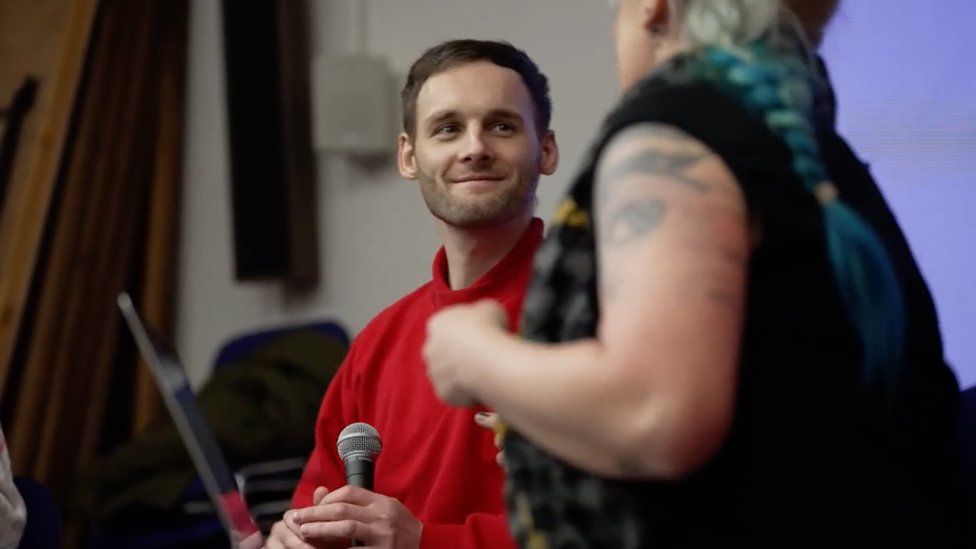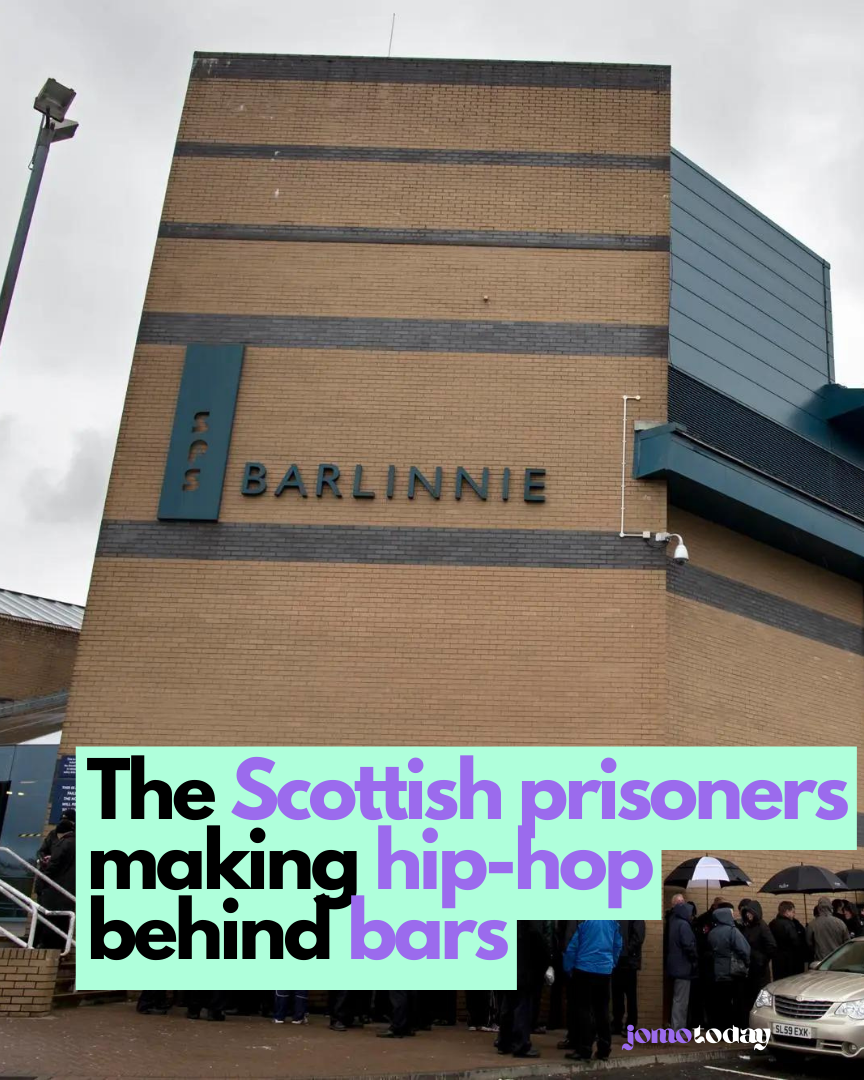Barlinnie Prison in Glasgow is providing inmates with the opportunity to create their own hip-hop music.

Barlinnie Prison in Glasgow has been giving inmates the chance to make their own hip-hop tracks.
Hip-hop echoes within the walls of Barlinnie, Scotland’s largest prison, where Abelbaset al-Megrahi, the Lockerbie bomber, once resided. Despite his absence, the legacy of the satellite dishes, courtesy of the Libyan government for his sports viewing, lingers on the prison’s facade.
Nestled in Glasgow’s northeast, known colloquially as The Big Hoose or Bar-L, Barlinnie boasts a 140-year history. Plans to shutter the facility await the construction of a successor, yet the closure date remains elusive.
On the frosty day of our visit, the prison teems at nearly 145% capacity, housing 1,418 inmates in a space designed for 987—a stark contrast to its intended size.
Amidst this backdrop, Barlinnie initiated its inaugural hip-hop classes for detainees. Sponsored by Creative Scotland, the eight-week program was envisioned by Jill Brown, founder of Conviction Records, Scotland’s pioneering label for former offenders.
Jill elucidates, “These workshops aim to amplify the voices of those participating, granting a platform to individuals often silenced within these walls. It’s a journey towards bolstering confidence, self-worth, and dignity—instilling a belief in oneself.”
She continues, “Moreover, they provide incarcerated individuals with something to anticipate. I often emphasize that the deprivation of hope is the most profound form of destitution.”
We were granted access behind the prison walls to converse with some of the inmates, despite almost facing a cancellation. The night prior, Barlinnie made the Scottish news due to a prisoner scaling the roof, flinging slates at guards in a solo protest.
By morning, the protester was back in confinement, and our visit was greenlit.
Our first stop was B Hall, housing 279 inmates primarily in double cells across four levels, retaining the original 1880s architecture with stone staircases and caged balconies.
Prisoners donned red sweatshirts for convictions and blue for remand.
On the second floor, we visited Bernie’s cell. If Eminem hailed from Govan at 32, Bernie was his doppelgänger, even recounting sneaking into a Slim Shady concert in Glasgow.
His cell, a small space dominated by white-brick walls, housed two desks and a metal bunk shared with his “co-pilot.”
“I used to spend 23 hours locked up when I first arrived,” Bernie said, shaking his head. “People crave punishment, but we’re already serving our time, trapped in our minds.”
Bernie now works in the kitchens and finds solace in hip-hop classes, adorned with small posters of Snoop Dogg and Tupac.
In Barlinnie since Boxing Day last year, Bernie confessed, “I resorted to breaking into businesses to fuel my addiction. It’s not who I am, but drugs led me there.”
In his early 20s, Bernie was a local rap figure, DJing on community radio. Collaborating with a professional producer on a new track has revitalized him: “It’s my sanctuary, keeps me grounded. Music helps restore my confidence.”
As we prepared for the day’s workshop, Bernie surprisingly retrieved an acoustic guitar from under his bunk, escorted by guards to the Wellbeing Centre, the prison’s hub for rehabilitation programs.
Certainly! Becci Wallace sees these sessions as an opportunity for individuals, including Bernie working on a heartfelt tribute, to express genuine emotions in a supportive environment. She hopes that this chance to be vulnerable will lead to long-term benefits, enabling them to handle difficult situations more thoughtfully instead of reacting hastily and negatively.
Regarding objections to providing free music classes to convicted criminals, Becci’s response is straightforward: If these individuals are repeatedly making the same errors and returning, why not introduce new approaches to help them break this cycle?
Robert, a 29-year-old serial reoffender from Kilmarnock currently serving just under three years, actively participates in the workshops. He strongly believes that the hip-hop classes hold the potential to instigate positive changes in his life.
Over the past two months, he has collaborated with Becci on his track titled “Time,” expressing his anxieties about the future in its lyrics: “Sometimes I think it is all fate? / Will I die young like half of my mates? / I’ve been numbing the pain, but the pain still hurts.”
“These workshops have given me something to anticipate,” he expresses.
“It’s something I plan to continue pursuing once I’m released. It’s come at the right time. It’s given me an opportunity.”
And could this involvement truly aid in preventing his future offenses?
“Yes, absolutely,” he affirms, nodding. He insists that he holds more hope for his post-release future now than ever before.
The hip-hop workshops concluded with a small showcase where the prisoners’ recorded songs were played for an audience of fellow inmates and guards.
On the day of the showcase, Bernie, feeling that his song about his daughter wasn’t finished, hastily recorded some older, more intense lyrics over a Dr. Dre-style beat. The resulting track, “Hate These Streets,” received a positive response, leaving Bernie relieved. He envisioned sharing his music on YouTube upon release, seeing it as a way to steer clear of trouble, focus positively, and reduce negativity.
Expressing his relief, Bernie said, “I’m turning my life around now, and I’m optimistic things will work out for me.”
For Robert, having his music showcased was a significant moment. “It’s given me hope, you know. I’ve managed to turn this time in prison into something positive.”
Looking ahead to 2024, organizer Jill Brown announced a change for the workshops: “Recognizing that hip-hop tends to resonate more with younger individuals, and considering many participants are singer-songwriters, we’ve decided to offer an alternative next year.”
In 2024, the focus will shift from hip-hop to folk music at Barlinnie, providing a different creative avenue for the incarcerated individuals.
Read More: Russian poets get jail sentences for anti-war poetry reading






Leave a Comment